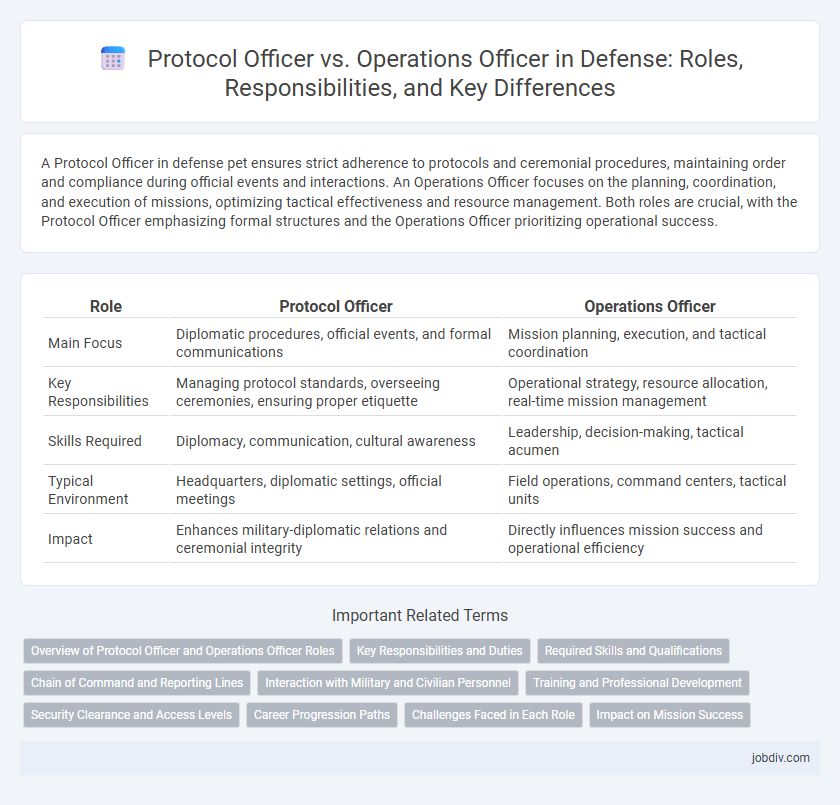A Protocol Officer in defense pet ensures strict adherence to protocols and ceremonial procedures, maintaining order and compliance during official events and interactions. An Operations Officer focuses on the planning, coordination, and execution of missions, optimizing tactical effectiveness and resource management. Both roles are crucial, with the Protocol Officer emphasizing formal structures and the Operations Officer prioritizing operational success.
Table of Comparison
| Role | Protocol Officer | Operations Officer |
|---|---|---|
| Main Focus | Diplomatic procedures, official events, and formal communications | Mission planning, execution, and tactical coordination |
| Key Responsibilities | Managing protocol standards, overseeing ceremonies, ensuring proper etiquette | Operational strategy, resource allocation, real-time mission management |
| Skills Required | Diplomacy, communication, cultural awareness | Leadership, decision-making, tactical acumen |
| Typical Environment | Headquarters, diplomatic settings, official meetings | Field operations, command centers, tactical units |
| Impact | Enhances military-diplomatic relations and ceremonial integrity | Directly influences mission success and operational efficiency |
Overview of Protocol Officer and Operations Officer Roles
Protocol Officers ensure diplomatic compliance and manage official ceremonies, maintaining proper conduct during military and governmental interactions. Operations Officers coordinate mission planning, execute strategic operations, and oversee unit readiness to achieve tactical objectives. Both roles are critical in defense, with Protocol Officers focusing on diplomatic protocol and Operations Officers emphasizing operational effectiveness.
Key Responsibilities and Duties
Protocol Officers manage diplomatic interactions, ensuring compliance with military etiquette, organizing official ceremonies, and coordinating high-level visits to maintain international relations. Operations Officers plan, execute, and oversee military missions, analyzing intelligence, managing resources, and directing tactical teams to achieve strategic objectives. Both roles are pivotal in defense, with Protocol Officers focusing on external diplomatic relations and Operations Officers concentrating on internal mission effectiveness.
Required Skills and Qualifications
Protocol Officers require exceptional communication skills, cultural awareness, and expertise in diplomatic procedures to manage formal events and international relations effectively. Operations Officers must possess strong leadership, strategic planning abilities, and proficiency in coordination of military or defense operations under high-pressure situations. Both roles demand security clearance and a thorough understanding of defense policies, but Operations Officers typically require advanced tactical training and operational experience.
Chain of Command and Reporting Lines
Protocol Officers manage diplomatic interactions and ensure adherence to formal procedures, reporting directly to senior command for guidance on official protocol. Operations Officers oversee daily mission execution, coordinating tactical units and reporting through the operational chain of command to maintain mission effectiveness. Clear differentiation in reporting lines ensures efficient command flow, with Protocol Officers interfacing primarily with strategic leadership and Operations Officers focused on tactical commanders.
Interaction with Military and Civilian Personnel
Protocol Officers coordinate formal interactions, ensuring adherence to diplomatic customs and facilitating communication between military leaders and civilian officials during official events. Operations Officers focus on tactical planning and execution, maintaining direct contact with military units and collaborating with civilian agencies to support mission objectives. Both roles require strong interpersonal skills but differ in their emphasis on ceremonial protocol versus operational coordination.
Training and Professional Development
Protocol Officers undergo specialized training in diplomatic procedures, cultural etiquette, and event coordination to manage high-level interactions effectively. Operations Officers focus on tactical and strategic training, including mission planning, intelligence analysis, and crisis management to support operational readiness. Continuous professional development for Protocol Officers emphasizes interpersonal skills and protocol updates, while Operations Officers prioritize leadership, technical skills, and adaptive strategies.
Security Clearance and Access Levels
Protocol Officers typically require a high-level security clearance, often Top Secret or above, to manage sensitive diplomatic interactions and classified communications. Operations Officers also hold equally stringent clearances, such as Top Secret/Sensitive Compartmented Information (TS/SCI), enabling access to critical intelligence and operational data. Access levels for both roles are strictly controlled, with Protocol Officers focusing on diplomatic channels and Operations Officers handling tactical, mission-critical information.
Career Progression Paths
Protocol Officers typically begin their careers managing diplomatic communications and ceremonial events, gradually advancing to senior advisory roles within military or governmental organizations. Operations Officers usually start in tactical or field-level planning positions, moving up to oversee large-scale mission execution and strategic operation coordination. Career progression for Protocol Officers centers on mastering diplomatic protocol and interagency collaboration, while Operations Officers focus on leadership in mission planning and operational command.
Challenges Faced in Each Role
Protocol Officers face challenges in maintaining diplomatic decorum and managing intricate international interactions, ensuring adherence to cultural sensitivities and formal procedures. Operations Officers encounter difficulties in coordinating complex mission logistics, responding to rapidly changing battlefield conditions, and synchronizing multiple unit activities for mission success. Both roles demand precise communication and adaptability under high-pressure defense environments.
Impact on Mission Success
A Protocol Officer ensures seamless diplomatic interactions and adherence to formal procedures, which facilitates secure and effective communication critical for mission success. An Operations Officer oversees mission planning and execution, directly influencing strategic decision-making and resource allocation that determine operational outcomes. Their combined roles enhance mission efficacy by balancing diplomatic precision with tactical execution, minimizing risks and maximizing strategic advantages.
Protocol Officer vs Operations Officer Infographic

 jobdiv.com
jobdiv.com